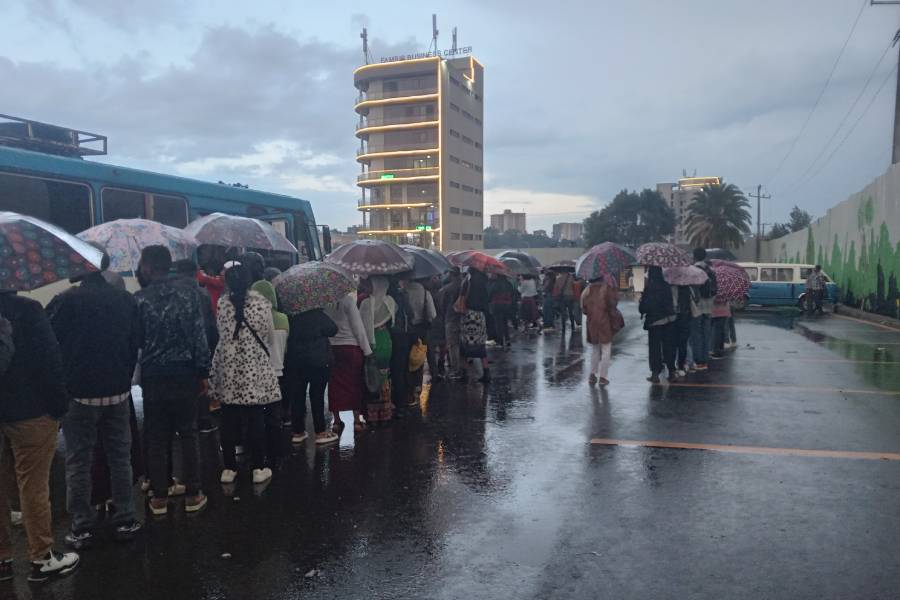
Fortune News | Aug 18,2024
A long-standing dispute between the management of the Hilton Addis and its employees’ trade union remains unresolved, despite recent efforts by the Ministry of Labour & Social Affairs to mediate the disagreement over the content of a collective agreement under negotiation.
Disputes over service charges, salary raises, and sick leave policies remain unsettled.
The ongoing dispute between Hilton Hotel’s management and its employees’ trade union highlights the challenges workers face in Ethiopia’s hospitality industry. As both parties prepare for another round of mediation, the outcome of these negotiations will have far-reaching implications for the rights and well-being of employees and the overall labour landscape in the country.
Over the past few years, Hilton Addis and some of its 430 workers have been embroiled in disagreements that led to a court case initiated by the labour union. The Addis Abeba City Government Labour Relation Board stepped in after the workers’ association made multiple attempts to resolve the issue.
A court order was issued in July 2021, mandating salary increases ranging from 11pc to 18pc. Additional rulings about service charges were also given, stating they should be halved if an employee is on leave. However, the disputes persisted between workers and the management, and no significant changes were made.
Habtom Tesfaye, president of the Hilton Hotel Workers` Association, argued that the ambiguity in the rulings allowed the management to continue its practices. The union leaders addressed their complaints to the Board of Directors, chaired by Yinager Dessie (PhD), former central bank governor, but received no response.
The Federation of Tourism, Hotels & Service Union has taken matters into its own hands. The Ministry organised long discussions between labour union leaders, the Confederation of Ethiopian Trade Union (CETU), and the Federation.
Asfaw Abebe, the Federation’s president, disclosed they plan to help negotiate the collective agreement between the management and workers of Hilton that expired almost five years ago.
“We’ve been holding prolonged negotiations with the management,” Asfaw told Fortune.
The Federation proposed a predictable annual salary increase based on the Hotel’s profit. The Union requested a 45pc increase if the hotel made a profit exceeding the target at the end of the year. However, Hilton’s managment was not happy with the proposal. It argued that employees missed sick leaves, prompting denial of service charges.
Hilton Hotel’s General Manager, Claus Steiner, declined to comment.
“I don’t want to talk about it,” he told Fortune.
Opened in 1969, Addis Ababa Hilton is one of Ethiopia's oldest and most renowned international hotel franchises. It remains a popular choice among locals and international visitors, with its prime location on Menelik II Avenue.
One of its employees, who has worked at the hotel for over 25 years, expressed fear of requesting sick leave under the current management, despite needing regular checkups for his diabetes. He claimed to have been overworked without receiving extra payments and subjected to negative responses when asking for a salary increase. The employee was promised a raise when the hotel exceeded its target profit by over 50pc, but the bonus never came.
Both parties agreed to bring their respective proposals to another round of mediation called by the Ministry.
Mehari Redae, an international law consultant and associate professor at Addis Abeba University, observed that salaries should be based on agreements between management and employees since there is no minimum wage.
“Salary increase is based on the employer’s will,” Mehari said.
According to Mehari, benefits from service charges and bonuses should be granted based on employees` work. If a worker is not providing services, the employer has the right to deny the benefit and wage deductions should be negotiated according to the collective agreement, he said. Mehari emphasized that the collective agreement’s strength depends on its clarity and comprehensiveness. In the collective agreement, the laws should be specific and detailed.
“Enforceability comes from explicitness,” he said.
Mehari referred to the labour law stating that any work exceeding 48 hours a week is considered overtime, which is only permissible for up to two hours a day and obliges employers to pay.
PUBLISHED ON
Apr 03,2023 [ VOL
24 , NO
1196]

Fortune News | Dec 10,2022

Delicate Number | Jun 07,2025

Fortune News | Dec 23,2023

Radar | Dec 05,2018

In-Picture | Sep 02,2024

Dec 22 , 2024 . By TIZITA SHEWAFERAW
Charged with transforming colossal state-owned enterprises into modern and competitiv...

Aug 18 , 2024 . By AKSAH ITALO
Although predictable Yonas Zerihun's job in the ride-hailing service is not immune to...

Jul 28 , 2024 . By TIZITA SHEWAFERAW
Unhabitual, perhaps too many, Samuel Gebreyohannes, 38, used to occasionally enjoy a couple of beers at breakfast. However, he recently swit...

Jul 13 , 2024 . By AKSAH ITALO
Investors who rely on tractors, trucks, and field vehicles for commuting, transporting commodities, and f...

Oct 4 , 2025
Eyob Tekalegn (PhD) had been in the Governor's chair for only weeks when, on Septembe...

Sep 27 , 2025
Four years into an experiment with “shock therapy” in education, the national moo...

Sep 20 , 2025
Getachew Reda's return to the national stage was always going to stir attention. Once...

Sep 13 , 2025
At its launch in Nairobi two years ago, the Africa Climate Summit was billed as the f...